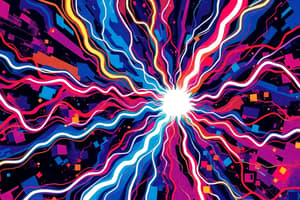Podcast
Questions and Answers
Which element is involved in hundreds of biochemical reactions and is essential to human health and food production?
Which element is involved in hundreds of biochemical reactions and is essential to human health and food production?
- Sodium
- Iron
- Magnesium (correct)
- Calcium
In the context of electricity, what role does magnesium play in magnesium sulfate (MgSO4) solutions?
In the context of electricity, what role does magnesium play in magnesium sulfate (MgSO4) solutions?
- Insulator
- Resistor
- Emitter
- Conductor (correct)
Which process involves the separation of positive and negative ions from an electrolyte solution?
Which process involves the separation of positive and negative ions from an electrolyte solution?
- Neutralization
- Oxidation
- Ionization (correct)
- Reduction
What is the force that pushes electrons through a circuit?
What is the force that pushes electrons through a circuit?
What concept describes the balance between voltage pushing electrons and resistance opposing their motion in a circuit?
What concept describes the balance between voltage pushing electrons and resistance opposing their motion in a circuit?
What type of process leads to the formation of oxide films on metals in electrochemical processes?
What type of process leads to the formation of oxide films on metals in electrochemical processes?
In electric circuits, what opposes the motion of electrons flowing through a wire?
In electric circuits, what opposes the motion of electrons flowing through a wire?
Which of the following elements is known for its conductivity in electrolyte solutions?
Which of the following elements is known for its conductivity in electrolyte solutions?
What property of electrolytes allows charged particles to move freely when dissolved in a liquid or molten state?
What property of electrolytes allows charged particles to move freely when dissolved in a liquid or molten state?
What role does voltage play in electric circuits?
What role does voltage play in electric circuits?
Flashcards are hidden until you start studying
Study Notes
Moving Charges and Magnesium
Magnesium is a lightweight alkaline earth metal with the atomic number of 12 and symbol Mg. It is essential to human health and food production because it is involved in hundreds of biochemical reactions. In this context, we will discuss moving charges and their relationship with magnesium, particularly in relation to electric currents.
Electric Current
Electric current is the flow of electric charge through a conductor such as a wire. This movement can be described using the concept of circuits, which consist of three basic elements: voltage, current, and resistance. Voltage is the force pushing electrons through a circuit, while resistance opposes this motion. When these forces balance out, electric current flows steadily from one point in the circuit to another, like water flowing through a pipe.
Moving Charges in Relation to Magnesium
In the context of electricity, magnesium acts as the electrolyte within its compound magnesium sulfate (MgSO4) solutions. Electrolytes have properties that make them conductive when dissolved in a liquid or molten state, allowing the charged particles in the solution to move freely. When an electrolyte solution loses a charge, the process is referred to as ionization.
During the ionization process, positive and negative ions separate from each other, forming distinct layers across a surface. These layers lead to the formation of oxide films on metals, which play a crucial role in electrochemical processes. In the case of magnesium, ionization results in the release of magnesium cations (positive) into the solution, where they contribute to the electric current by acting as carriers of electrical charge.
Summary
The relationship between moving charges and magnesium is rooted in the metal's behavior as an electrolyte. When magnesium compounds dissolve in a solution, magnesium ions move freely, contributing to the electric current by carrying electrical charge. This process is essential in various electrochemical applications, highlighting the importance of understanding the properties of different materials in the context of electric currents.
Studying That Suits You
Use AI to generate personalized quizzes and flashcards to suit your learning preferences.




